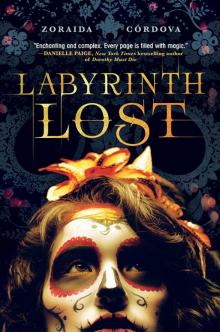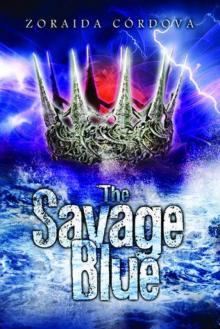- Home
- Zoraida Cordova
Life on the Level: On the Verge - Book Three Page 2
Life on the Level: On the Verge - Book Three Read online
Page 2
“Go, go!” I shout at the driver.
He hits the gas, and as my cowboy steps onto his lawn, we’re well on our way.
I don’t look back.
• • •
The cab driver gives me an odd look. He’s my age, but still has acne. His lower lip hangs a bit, and I can see the yellow and black stains that tell me he chews tobacco, and probably has since he was a teen.
“E’rything all right?” he asks. It’s an accent I’ve never heard. I’d say southern, except we’re not in the south.
The question itself throws me a bit. I’m not used to getting driven around. Unlike Sky, I got my license when I was seventeen, but I’d been stealing my dad’s ride since way before that. Still, the times I take a taxi, I’m not used to the drivers trying to engage with me.
“Everything’s copasetic,” I say. “He didn’t kidnap me or anything.”
There’s a smile, like he’s not sure if I’m joking.
“You’re not from around here.”
“How can you tell?”
He shrugs, and makes a turn onto a highway. My stomach churns. Partly from everything I drank last night, and partly because I don’t remember if Cowboy drove on a highway. Suddenly, all the stories I read about girls getting kidnapped by taxi drivers in backwoods towns in the middle of Nowhere, USA start sounding a screeching warning in my mind.
“Seattle?” the cabdriver asks.
“New York,” I say, indignant for no reason.
He cocks an eyebrow and presses his lips together in that nod people do when they’re impressed.
When we turn back onto a street with more shops, I start to worry less. He’s probably not a kidnapper. I’m going to be reunited with my car. I’m going to continue with my plan. Tabula rasa. Clean slate and all that. It’s the first time I’ve done this. First time I’ve committed to it, at least. It’s usually just one of those things I keep threatening to do to please the people who love me.
This time, I’m doing it for me.
“So, what do people do around here for fun?” Not that I’ll be partaking in that fun. The next ninety days I’ve already volunteered away. It’s not a done deal, but a girl can dream.
“First time in Zoo Town, then.”
“Zoo what?”
He chuckles, and glances at me through the rearview mirror. “That’s what we call Missoula.”
“Ahh. So what do people do for fun in Zoo Town?”
“Depends. What do you like?”
I roll down the window and fish out the cigarettes in my backpack. The car already has the stale smell of smokes. When I light it, he doesn’t say anything, and I take that as permission that I can.
“You know,” I say. “Fun. Card games, good food, surly bartenders.”
Why are you doing this, River? Sometimes my inner voice sounds like Sky, all disappointed and stressed out.
“You’ve already been to Grizzly Bar. Not bad, ‘cept the college crowd makes half the places in town shitty. Grizzly for greasy food. The Iron Horse turns into a bar after dinner. The Golden Rose is the last bar in the city where you can smoke indoors. Red’s if you’re a football fan, and if you’re in town for a while, you’d better be.”
“Casinos?” I ask.
Stop it, River.
“A few near the mall,” he says. “But it’s not Atlantic City or anything.”
I take a deep drag and blow it out slowly, pushing the gray smoke as I make eye contact with him in the rearview mirror.
“Hmmm,” I say.
“The Golden Rose has a backdoor that never closes. Three grand buy-in. They make you check your cellphone at the door.”
I smile, but don’t say anything. Sometimes it just helps to know things. I know where I can go if I need a fix. But I won’t need it, because this time it’s different.
I finish my cigarette just as we reach the bar. My car is parked in the lot beside three others.
“Lucky they don’t tow on Sunday mornings,” he says. “That’ll be twenty bucks.”
I give him thirty and tell him to keep the change. He doesn’t leave right away, and I gather it’s because he wants to ask me a question. His window’s rolled down and he’s hanging his arm from it. If I turn around, I bet he’s licking the spot on his bottom teeth that’s started to turn black.
I don’t look back. I take a deep breath and get in my front seat. The taxi drives off before I do.
As I drive, the town starts to wake up. Downtown Missoula is a colorful little town. Bigger than a town, but not big enough to be a city. It seems like the kind of place that’s small enough that you could bump into people you know while out to dinner, but big enough that you might find a way to get lost in the lush mountain valley. It’s not the same kind of lost as New York, but then again, I don’t think I could find that anywhere.
I pull on to a street where morning joggers make their way to Mount Sentinel, where a giant white letter M is a beacon for the city.
Dogs are getting walked. Church pews are getting filled. A pretty blonde girl sets up the daily specials board outside a coffee shop. A guy with a backpack is all ready to be the first customer. I feel like I’m halfway between Pleasantville and the most charming place I’ll ever visit. Even though I’ve never called anything charming in my whole life. Not out loud anyway.
I set up the GPS on my phone, and let the polite robotic lady voice guide me up a hill and forty-eight miles south. After how far I’ve traveled, that’s just a stone throw, and a sign that Sun Valley is easy enough to miss if you’re not looking. On the main street there’s a bar, a diner, a gas station, and then that’s it. Everything there is to see is on the main strip. I turn on my right signal light as I spot the other sign I’m looking for. It’s hard to get lost when the road is this straight. An unpaved road lined with trees and tall grass leads to a ranch.
The sign at the entrance is nondescript and unassuming—it’s just a symbol of a pine tree with a sun logo. It means something to the people looking for it.
I drum my fingers on the steering wheel. I flick on my turn signal even though I’m the only car on the road. My wheels crunch against the gravel path that leads up to the main building, a giant log cabin mansion.
Because of course it’s a log cabin.
There’s someone standing at the front. A woman with brown hair and brown eyes, dressed in jeans and a plaid shirt. She doesn’t smile, but doesn’t look angry either. She holds a clipboard, and motions for someone to come out and help her.
I park in front of her, and lower my window.
My heart is hammering a thousand times per minute. I look over my shoulder, down the path I just came from. It’s not too late. I can turn around. I can hit the gas and get back on the highway. I’ve had a pretty good time so far. Just driving. Just me. Just the road and the quiet and the safety of knowing that I’m in control.
Except I’m not in control.
I squeeze the steering wheel, and try to unstick the breath lodged in my lungs. I’m not in control, and that’s the reason I got on that road, and looked for that quiet, and went on the run.
That’s the reason I needed one last night to say goodbye to everything that made me who I am now. I close my eyes for a second and think of him—his dark hair and his perfect mouth. A tiny shiver runs through my body. That’s enough. I push the thought of him away and concentrate on my future.
“Good morning,” the woman standing out front says, looking up from her clipboard.
“Hi, I’m River Thomas.”
“Oh! We weren’t expecting you ‘til tonight.”
“Is it okay?”
“Of course! Just park over in the lot, and I’ll meet you back here. I’m Helen. Welcome to Horse Creek Recovery Center.”
I can’t help but laugh to myself. That’s a pretty fancy way of saying, “Welcome to rehab.”
Chapter 3
My daddy liked to say I have the perfect face for poker. He didn’t believe in tells, but he knew other people
believe in them. He said when people are looking for tells they’re easier to fool. Said I have a face that could fool a man into betting his whole fortune. Just like my mother.
He’d know, because he lost everything to her.
Everything except me.
“This is the lobby,” Helen says, needlessly pointing out what I can figure out for myself.
Maybe she thinks I’m so out of it I can’t tell what I’m looking at. Someone else is already checking in, being given the grand tour by a middle-aged African American guy with a nice smile. The patient looks disoriented, clutching a backpack to his chest. He doesn’t look any older than me.
Horse Creek Recovery Center doesn’t look like a typical rehab place. I’ve never been forced to attend before, but I was at one back when my dad took a bad turn. I was in high school and he was on a month-long losing streak, heading straight into the grave. If his bookie hadn’t been his best friend, I don’t know what my dad would’ve done. Maybe killed himself before his cancer got the chance to do it. It sounds terrible, but I’ll call a spade a spade, and that was my daddy.
Dad’s rehab center was all white with blinding lights that made you feel like you were walking through a dream of Limbo. The patients walked around like ghosts of themselves, haunted eyes and open mouths moaning for another hit.
This place is nothing like that. Everyone wears normal clothes. Some people even look happy. We pass a room painted bright blue where groups are gathered around tables covered in board games. There’s a tiny theater with old couches, and popcorn kernels littered on the floor. A girl with raccoon eyes is watching a romantic comedy while a guy snores at the other end of the room. It doesn’t seem to bother her. What does seem to bother her is me standing at the door.
“Do you mind?” she mutters, sinking into her seat.
Helen purses her lips, but doesn’t comment further.
“As you can see, there are many things you can do here at HCRC. There are daily group meetings, and weekly individual sessions with an assigned counselor. Besides that, we like to keep active. Equine therapy is our specialty, though we do offer outdoor excursions like hiking and weeklong camping trips. During the winter there’s skiing and ice fishing.”
“You’re not afraid someone’s going to get lost in the wilderness?” I joke.
She laughs. I decide I like her laugh. It’s not fake or motherly. She’s more like a friend who has lots of responsibility and is in charge. She doesn’t wear a ring, and her clothes are comfortable, but professional. I bet she’s single, perhaps divorced once and trying to focus on her career this time around.
I lick my canine as I study her some more. She’s got deep laugh lines, but this is the first time I’ve heard her laugh since I arrived. She holds her pen the way longtime smokers hold their cigarettes. I spot the start of a tattoo on her forearm, but the long sleeves of her shirt cover it. A name, perhaps. Her ex-husband, or maybe her mother. No, definitely her ex.
“Today you’ll start off easy,” she says. “Explore the grounds; talk to the others. Dinner is at six thirty, and once the kitchen’s closed for the night, there isn’t any going back for seconds. Do you have any food restrictions?”
I shake my head.
“Is there a—commissary? I don’t know the right word.”
There’s that laugh again. “Goodness, River. You’re not in prison. I hope you’re here because you don’t want to go to prison.”
I can feel my cheeks turn red. “It’s my first time trying.”
“It’s very brave of you. And no, you’re allowed to have your own money. Meals are included in your fees, but things like cigarettes and junk food you can get at the concession stand.”
I nod, digging my hands so far into my pockets I’m afraid I’ll rip the seams. Helen places a hand on my shoulder and pats me like I’m a child in need of comforting. Everyone here is in some need of comforting. That’s why they’re here in the first place. Too much taking comfort in bad things. Too much instant gratification.
“Look,” she says. “We don’t get many people who admit themselves. Most of the time it’s a parent or family member, or the rare good friend. Too often it’s the law giving someone an ultimatum. You’re here of your own free will, and that takes a whole lot of courage.”
I don’t say anything. I guess the right thing to say is “thank you.” But I don’t think that I’m brave at all. Bravery would have been doing this sooner, or sticking around to right my wrongs. Brave is not something I am.
“Now,” she says, leading me down another corridor decked in more Montana taxidermy and freshly waxed pine floors. “We’ll go get the rest of your things and finish check-in, and then I’ll show you to your room.”
• • •
“Is this necessary?” I mutter, crossing my arms over my chest.
The ranch’s hand, Taylor Patrick, inspects my car. He chews gum as he looks me up and down. His eyes linger on my legs a little bit too long.
“It’s standard,” Helen tells me from the other side of the car. “Everyone submits themselves to inspection. You’re coming into a facility where people are trying to recover. We have to make sure nothing gets in. Now, is there any alcohol or contraband in your possession or vehicle?”
I gnaw on the inside of my lip. I’m liking Helen a little bit less at the moment. I duck to tie my shoe, just as two cars pull into the driveway. They go around back to park, which means they’re employees. I sigh, deflating like a balloon. Fresh start, River, I tell myself.
“We’re not going to arrest you,” Helen reassures me. “We want you to have a clean slate.”
“There’s a flask under the passenger seat and a makeup bag with my prescription drugs. All legit.”
I wasn’t going to bring it in with me. It’s just a backup, you know. It’s not like I was going to share.
Helen takes the bottle of Xanax and Vicodin, along with my flask, the one with an R engraved at the center. It’s full of Tullamore Dew, my daddy’s favorite whiskey. She puts it all in a large white ziplock bag.
“That’s it,” I say.
But that’s not it. I have a baggie of percs in the lining of the bra I’m wearing. I can feel sweat beads protrude on my forehead, but I blame the noonday sun.
I follow Helen and Taylor past the front desk and into the main office. Taylor sets down my bags and Helen puts on latex gloves. They unzip it and go through the contents. I swallow. My mouth is dry.
Taylor laughs. “Guess it’s true. People do wear a lot of black in New York City.”
I give him a pained smile.
They search my wallet. I’ve got a hundred in change, a photo of my dad from when he was in the Navy, and another of my girls and me from the beach this past summer. I’m annoyed that I have to tug it out of Taylor’s hand, like he’s trying to be cute.
They take my nail clippers, eyelash curler, and my self-defense keychain that looks like a golden cat, leaving my clothes, books, and overpriced hair products. They ask for my cell phone, but let me send all the texts I need to first.
Sky: I know you’re busy getting tan with your sexy roofer. I can’t decide if this place is a cult or not. I’ve been stripped down and had everything confiscated like a criminal. I’ll have access to e-mail (I hope). Love, Me. E-mail: [email protected]
Leti: I had the best sex of my life last night. And I didn’t even know his name. BOOM. Commencing ninety-day lock down: [email protected]
Lucky: Thanks again for hooking me up with that bar in Missoula.
Pepe: I’m sorry again. I’m at the rehab center. It’s weird. Love you.
Dad: I miss you.
I get a sender error back from that last one and I swallow the lump in my throat. I want to laugh. Hi, I’m River Thomas, and sometimes I text my dead father, who was also a gambling addict, among other things. That should be my opening statement at group tomorrow.
As Helen moves to pry my phone out of my hands, a new text comes in.
&nb
sp; “Just one more, please.”
“What is it with this generation and texting?” she mutters.
The text sends a shiver down my spine. It’s a New York number. 917. Heard u skipped town. U don’t think I’ll find u?
I press the power button, then slide it off.
“No one turns these on, right?” I ask.
“It’s all locked up until you check out. Is everything okay?”
I look around the office. There are tons of little cages where they lock up patients’ belongings. The phone in the lobby rings its shrill ring. Taylor walks by, helping an old man with his bags as he’s leaving the building.
“River,” Helen asks, sounding out my name in that way that doctors have, like they’re trying to call you back to earth, like they’re trying to get you to focus on the sound of their voice and not on the spinning thoughts in your head. “River. Something upset you.”
“It’s just—” I shake my head. I cough a laugh. “It’s just what you said. My generation and all that. It’s all the contact I have with my friends. It’s hard letting go.”
I feel like she can see through my lie. “There’s a computer room. One of our patients is working on her young adult novel. You’ll have access to basic e-mail and there’s a mailroom for the ancient art of letter writing. There are these artifacts we have called pens and pencils.”
“You’re funny,” I say.
“Don’t sound so surprised. Just because we’re in the middle of nowhere doesn’t mean I don’t know a thing or two about life. You name it, and I’ve probably done it. Twice.”
“Good to know. Well, now that you know my bra size,” I say, “can you show me to my room? I’m beat.”
As we head up the polished wooden steps, she says, “We’re not trying to invade your privacy. We have an open-door policy. Removing possibly harmful things so that everyone here is safe.”
“Objects themselves aren’t harmful,” I say. “People are the ones who are harmful, doc.”
She stops at a door marked 3A. Three was my dad’s lucky number. Mine is four.

 Incendiary Series, Book 1
Incendiary Series, Book 1 A Crash of Fate
A Crash of Fate The Inheritance of Orquídea Divina
The Inheritance of Orquídea Divina Incendiary (Hollow Crown)
Incendiary (Hollow Crown) Labyrinth Lost
Labyrinth Lost Love on the Ledge
Love on the Ledge The Savage Blue
The Savage Blue Vast and Brutal Sea
Vast and Brutal Sea Life on the Level: On the Verge - Book Three
Life on the Level: On the Verge - Book Three The Vicious Deep
The Vicious Deep Luck on the Line
Luck on the Line Bruja Born
Bruja Born Illusionary
Illusionary Vicious Deep
Vicious Deep